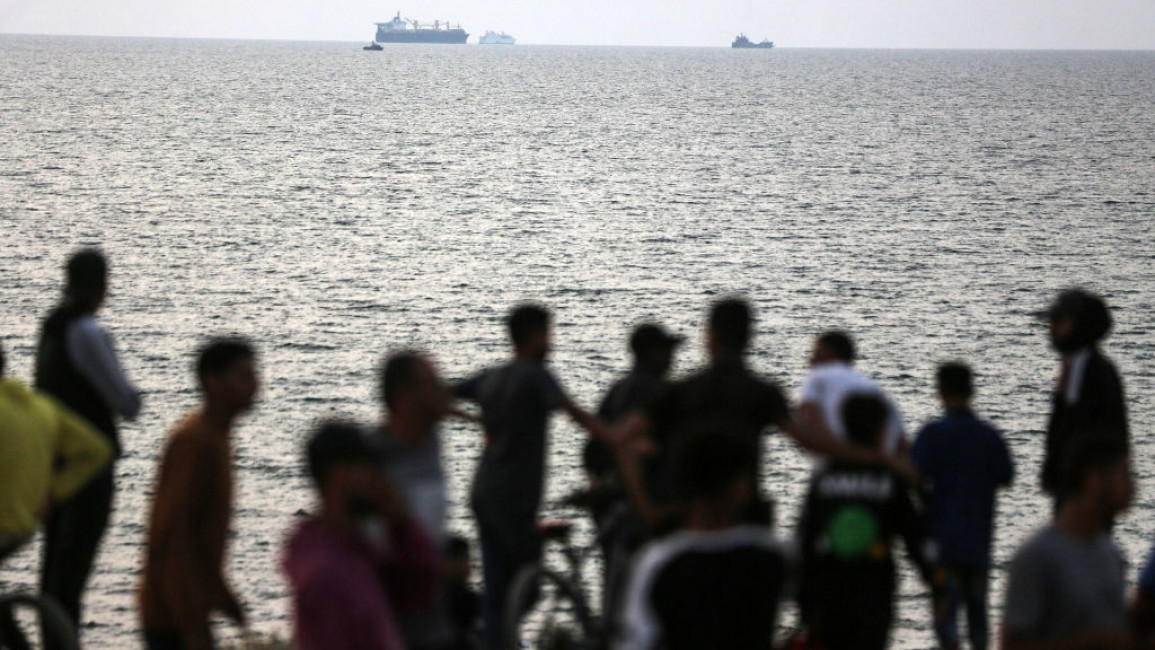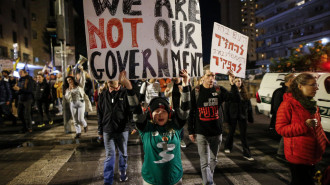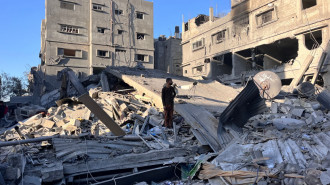Aid organisations slam $320m US pier in Gaza which fell apart
Aid organisations have criticised a US-built temporary pier in Gaza used to transport aid into the besieged enclave, after satellite images revealed it breaking apart.
The imagery showed the sea damaging the pier on Tuesday, with sections needing rebuilding and repairing.
The pier, which is made up of a narrow causeway and an area used to place supplies transported by ship, cost $320 million and went into use on 17 May.
US Department of Defense spokesperson Sabrina Singh spokesperson told reporters it will now have to be moved to Ashdod in Israel, where repairs will take at least a week to be completed.
According to CNN, the pier, known as the Joint Logistics Over the Shore (JLOTS), can only operate in good conditions.
Michael Selby-Green, a media spokesperson for Islamic Relief told The New Arab that his group and other aid organisations have repeatedly warned that the pier could not be a substitute for getting aid through land crossings that already exist.
"The damage sustained by the floating pier two weeks after it began operating exposes the structure for the distraction that it is," he said.
He clarified that even at full capacity, the pier only delivers a small fraction of aid that could be brought in by trucks.
"It's taken two-and-a-half months to build the pier and deliver the claimed 1,000 metric tonnes of aid, which is a drop in the ocean compared to what's needed in Gaza. Every day that passes pushes more families closer to starvation and puts more lives at risk," he added.
Singh, the US Department of Defense spokesperson, also said land routes are the most effective for aid.
"I would point out the fact that, you know, we have been able to surge – or get over 1,000 metric tons over that pier into Gaza, so we know it's effective. But the most efficient way to get aid in would be through the land rotes," she said.
Sam Taylor, Doctors Without Borders (MSF) UK director of communications, called new crossing points and initiatives "an illusion of improvement".
Taylor said bringing aid in through the pier was "sub-optimal and the sign of a failure rather than success", though "we are open to all and any options to get supplies into Gaza" since the situation for people trapped in centre and south of the strip is becoming "particularly dire".
"The lack of desperately needed humanitarian aid reaching people in Gaza is not a logistics problem, it is a political problem," the MSF UK communications director said, adding the aid transferred through the pier so far is just a "drop in the ocean in the skyrocketing humanitarian needs of 2.2 million people" in the territory.
The pier's falling apart comes as conditions in Rafah and the rest of Gaza worsen amid heavy Israeli bombardment, which has been ongoing for almost eight months.
Other aid organisations criticised the pier's sustainability, highlighting that it should not be seen as an alternative to land routes.
"The news sadly shows that, as aid agencies have been warning, the pier is going to be an expensive, time-consuming and unviable option as an aid route in the long run," Ahmed Bayram, the Middle East and North Africa media adviser for the Norwegian Refugee Council (NRC), told The New Arab.
"The pier can at most bring in 150 trucks a day while we are asking for thousands of trucks to pull the entire population back from the brink. It doesn't take a mathematician to figure out which is the only viable option here."
Randa Ghazy, Save the Children's regional media manager for the Middle East and North Africa, said the situation has become dire, especially for children, and the general conditions have worsened.
She told The New Arab that different crossings opening and closing "shouldn't distract us from the bigger picture that the people of Gaza are in desperate need for aid via the established land routes".
"The unpredictable trickle of aid into Gaza has created a mirage of improved access while the humanitarian response is in reality on the verge of collapse… despite assurances from the Israeli government that more ais is entering or will enter Gaza, we are yet to see levels of aid meeting the vast levels of need in Gaza and there is simply no excuse," she said.
The UN's World Food Programme confirmed to The New Arab on Tuesday that its operations through the pier have paused to resolve technical issues, and once problems are sorted it will resume dispatches again.
Intensified attacks on Rafah
Twenty aid organisations and rights groups, including MSF, Amnesty International, NRC, Save the Children International, and Islamic Relief, have warned about the lack of aid amid intensified attacks on Rafah.
They said in a joint Tuesday statement that aid agencies now fear deaths from starvation, disease and medical assistance will escalate, while Israel systematically obstructs crossing points.
Several aid organisations who spoke to The New Arab said every avenue of aid delivery in Gaza is either obstructed or subject to severe complications.
Israel's war on Gaza, which started on 7 October, has killed at least 36,171 Palestinians, and wounded at least 81,420 others. The bombardment has wreaked havoc on the enclave and plunged it into a deep humanitarian crisis, with many aid organisations warning against "catastrophic levels of hunger" and famine in the Strip.
Over 27 people have died in Gaza as a result of malnutrition and dehydration, as Israel continues to obstruct aid to the enclave.
The 20 civil society groups said in their Tuesday statement that Gaza's health system has "effectively dismantled", with virtually every hospital in the enclave either being issued 'evacuation orders', under Israeli siege, or soon to run out of fuel and supplies.







 Follow the Middle East's top stories in English at The New Arab on Google News
Follow the Middle East's top stories in English at The New Arab on Google News


